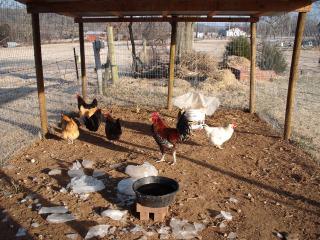I'm in Michigan, and this will be our first winter with the chickens. Our coop is insulated and we don't plan to add heat. The outdoor run has a roof, and we plan to add plastic on the sides, so I assume they will still go outside quite a bit. They are used to free-ranging most days, but I'm not sure about that yet. So here are my questions:
1. Are they more vulnerable to predetors in the winter when the leaves are gone for cover?
2. They are used to having both food and water in the coop and in the outdoor run 24/7. If I want to limit it to 1 water for winter, would it be better to keep it in the coop or the outdoor run?
3. If we make one of those cookie tin water heaters, do you set it right down in the deep litter? That seems like a fire hazard. It seems safer to put it in the outdoor run on the hard dirt.
Thanks for any ideas!
Angie
1. Are they more vulnerable to predetors in the winter when the leaves are gone for cover?
2. They are used to having both food and water in the coop and in the outdoor run 24/7. If I want to limit it to 1 water for winter, would it be better to keep it in the coop or the outdoor run?
3. If we make one of those cookie tin water heaters, do you set it right down in the deep litter? That seems like a fire hazard. It seems safer to put it in the outdoor run on the hard dirt.
Thanks for any ideas!
Angie






